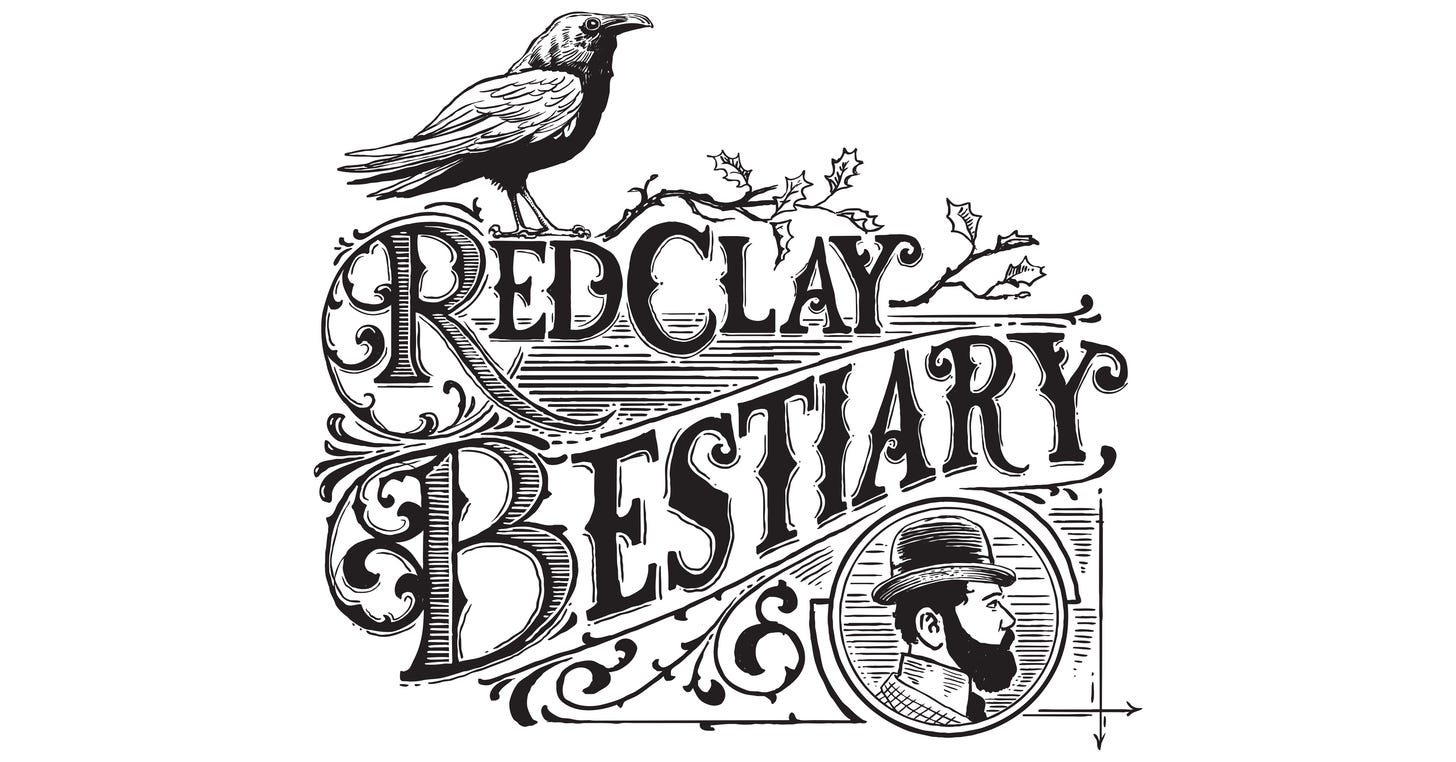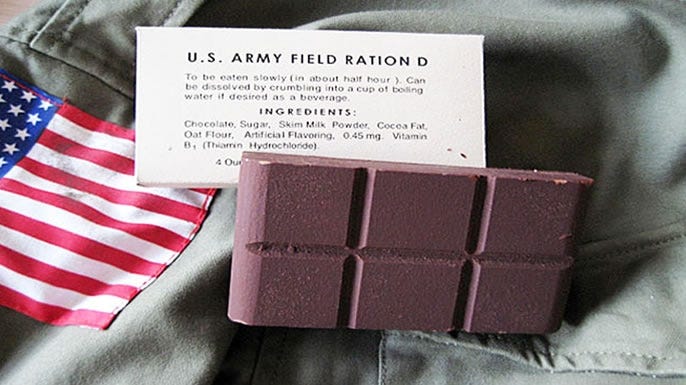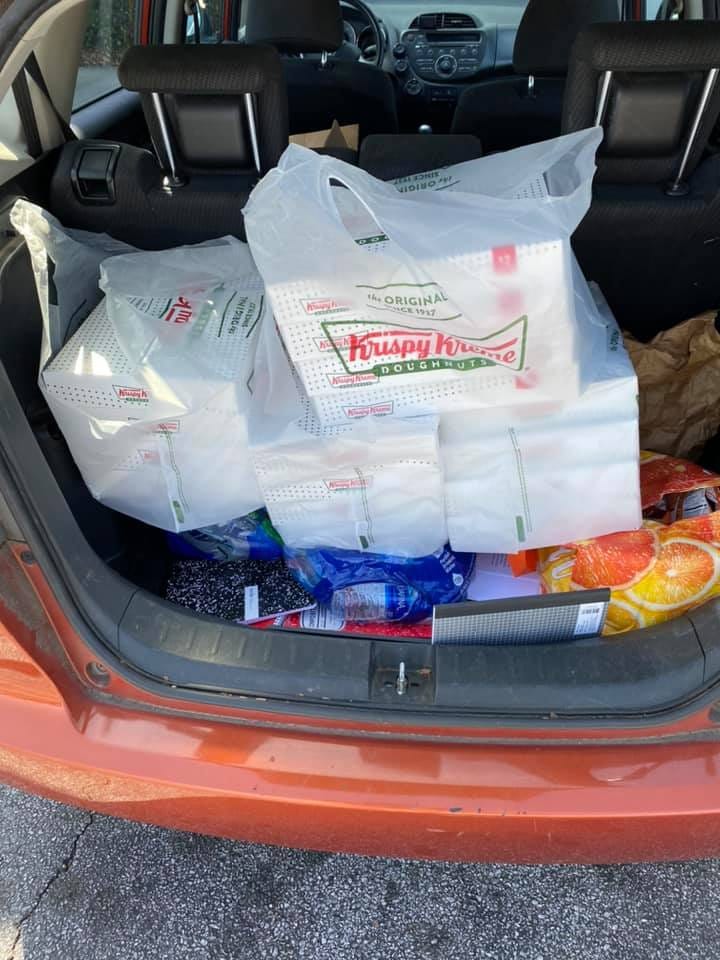Dough′nut, noun A small cake (usually sweetened) fried in a kettle of boiling lard.
— Webster’s Unabridged Dictionary, 1913 edition
Hollow-eyed French children eating giant blocks of Hershey’s chocolate proffered to them by handsome GIs is a well-worn cliche in films about World War Two. It’s probably based in some nugget of reality, though whether it actually involved the so-called Logan Bars (named for the U.S. Quartermaster at the time of their development in 1937) issued to soldiers as a source of quick energy is unlikely. The bars were formulated to be more or less indestructible and to taste “a little better than a boiled potato” so as not to tempt soldiers into devouring them all at the outset of a campaign. They were the most humble members of the chocolate family but they served their purpose well enough that even now, seventy-five years on, we still pay them this frequent if fictional homage.
I thought about this last Tuesday as I embarked on the Election Day duty for which I’d volunteered: poll support. The task consisted of driving a route of eight polling locations, reporting back the length of the wait at each, and supplying the workers with anything they needed from my trunk full of water and hand sanitizer and other bits of gear. I found out real quick that I was about as useful as wings on a turtle—the polling centers were all well-stocked with the basics—but in a national emergency we all have to do whatever duty falls to us, and since a job worth doing is worth doing well, I was determined to find a use for those turtle flappers.
Owing to my customary poor planning I started the day on about five-and-a-half hours’ sleep, which some of you probably will scoff at, but it takes a lot of energy to keep this tower of brains and brawn operating with the customary sparkle of the eye, and five and a half hours is just pissing in the ocean. So I swallowed a pot of coffee and zapped over to Metropolitan Studios in East Atlanta where my wife had taken classes before the pandemic—it was serving as a supply depot for me and my comrades—before joining the boiling froth of drivers on I-75 South, each one an angry countenance peering out of car windows like that familiar blue-white dodecahedron engraved with a gnomic legend and floating in inky-black Magic Eight Ball juice: Reply hazy, try again. Automobiles shot past me like meteors as I clung to the lower edge of sixty-five steely miles an hour in my Honda Fit (with the sports package, natch) and its dainty little sewing machine engine.
Clayton County is a fascinating and I would venture to say underrated little chip of Georgia, one to which I owe much more time given not just its significance but its proximity. Unfortunately the current of money and whiteness in Atlanta flows north, and I feel it just like everyone else. Clayton is the third smallest county in Georgia by area, but the fifth largest in population. It has gone, in the space of some forty years, from 91% white to 66% black, as white flight separated Atlanta into two distinct layers tangibly characterized by race and wealth. Clayton County is 78th in per capita income, but butts directly against county number two—my own county of Fulton.
78 is not great, but given that Georgia has a rather absurd 159 counties, it’s really no worse than I did in high school. Clayton’s big economic driver is Hartsfield-Jackson Airport, which I’m sure any county in Georgia would covet. I don’t have any airports. The area to which I was assigned described a triangle between Jonesboro, Lovejoy, and Fayetteville, all of which, despite being dinky little cities more or less indistinguishable from the megalopolitic stain that spreads out from Atlanta like spilled coffee, are fully functional economic machines, enjoying an income level double that of the rest of the county. In practice this meant the gaunt presence of Walmart, McDonald’s, and all that sort of late capitalist plaque smeared along a central highway. I presume all three possess lovely downtown squares, possibly even lacking the ubiquitous and seemingly mandatory Confederate monument planted in front of the courthouse like an unfortunate tattoo. Don’t get me wrong: I don’t believe we shouldn’t honor the dead. I just think it’s interesting that the Confederate statues sit on the town square while the slave shackles sit in museums. Anyway I didn’t get to see any of that, as my beat was confined to the sclerotic fringe, where lived the bulk of Clayton’s population.
I was also obliged to ignore the historical clamor to my ears coming from Lovejoy and Jonesboro. The former was the site of one of the last battles of Sherman’s Atlanta Campaign, and the latter was the site of the last, in which Union troops drove their enemy from his railroad supply line, rendering the Confederate Army of Tennessee largely moot for the flaccid coda of the war in the Western theater. It’s fitting that this last scrap of sinew binding the South’s industrial muscle to the limb should now belong to the descendants of those that built it against their will.
What they built in these three towns is a mystery to me, but I would imagine plantations had a lot to do with it. The fictional Tara Plantation from Gone with Wind is located just outside Jonesboro, and the city celebrates its imaginary heritage in the name of a major thoroughfare, Tara Boulevard. It also celebrates, in road form, Betty Talmadge, who bought a portion of the Tara set and donated it to the Atlanta History Center, from whence it made its way to the Margaret Mitchell House. That’d be interesting in itself, but on top of that, she was the wife of Herman Talmadge, who was governor of this often ridiculous state from ‘48 to ‘55, and then a U.S. Senator until 1981, which is utterly gobsmacking when you know that he was also a staunch segregationist and a lead player in the Three Governors controversy in ‘46 and ‘47, in which Talmadge, the outgoing governor Ellis Arnall, and the lieutenant governor-elect, one Melvin Thompson, all laid claim to the gubernatorial crown upon the the death the governor-elect, Talmadge’s father—like some hillbilly version of the Carolingian wars of succession.
I rolled into the Mundy’s Mill High School parking lot a few minutes before eight. Popping the hatchback I pondered my supply cache. Shall I simply distribute everything as quickly as possible? Or should I ask people what they need? The water and snacks I could get rid of easily enough, but I also had first aid materials, sunscreen, hand sanitizer, a pack of masks, and a bag full of feminine hygiene products, which were particularly problematic for me. I’m not an ass: I’ll buy this stuff for my wife without having a hypermasculine freakout, but I’m also sensitive to the issues involved in asking a strange woman if she needs a tampon. I decided on an open-ended approach: I’d just ask the poll workers what they needed, and try to make abundantly clear that I was entirely at their disposal and willing to procure anything short of bourbon. And maybe bourbon too, what the hell.
I walked in and addressed myself to four middle-aged Black women providing voter guidance. I realized too late that I couldn’t remember the name of the organization I was representing, and so wound up referring to it as simply, “an organization,” which I’m sure sounded creepy as hell, especially coming from a large, bearded white man wearing a Black Cat t-shirt. I told them I was checking on wait times, which is exactly the sort of thing I would have asked if I was trying to figure out when to detonate something or empty a semiautomatic something else. There was no wait, they told me. “Do y’all need anything?” I asked.
Nonplussed, they said nothing.
“Shall I bring water and snacks?” I queried tremulously.
“Sure!” they responded, brightening a lumen or two. I went out to the car and carefully counted out an eighth of the water and snacks, then brought them back inside, depositing them next to—what else?—a box containing water and snacks. Then I left. Driving to the next polling location I reviewed the exchange. I decided I would husband my supplies until they were actually needed rather than simply desired, lest I should run short at a crucial moment.
At Kemp Elementary I strolled up confidently to the first person I saw. She preempted my introduction, asking if I was there to vote. “No,” I blurted out clumsily, “I just want to know what the wait is.”
“No wait!” she replied brightly.
“Ok. That’s all I need to know.” I spun on my heel, feeling eyes on my back. We won’t live past noon, I could feel them thinking at me. I completely forgot to ask if they needed supplies.
Again I reviewed and revamped my game plan. At the next location I carefully introduced myself to the woman at the door—Fletcher Moore, working for Atlanta Arts Relief, tracking wait times and providing supplies. I was succinct but informative, enthusiastic and warm, ready to move mountains for the people doing the real work. She told me I’d have to talk to the director, who was busy at the moment and would I please wait. So I waited for a good ten minutes, digging my toe into the floor and avoiding eye contact with the dozen or so people in the room all wondering when I was going to pull out my MAGA hat and start yelling obscenities. When he finally came to talk to me I delivered a cold, congealed version of my spiel. “Do you need anything?” I concluded.
He looked at me in silence, his expression hidden behind his mask.
And it was pretty much a downhill run from there. It was probably at least partly my deteriorating state of mind, but each polling center seemed less welcoming than the last. Suspicion clouded every eye. At the last location on my list, I ran afoul of a tall black man wearing a ball cap with a big white cross on it. Spotting me at some distance he came out of the voting room into the hallway, stopping me a good twenty feet away with the demeanor of a Chuck-e-Cheese manager escorting an angry drunk from the ball pit. I delivered my monologue as crisply as I was able, but he shut me down before I could even fit a period to my last sentence. “No,” he said curtly, underlining it twice, “we don’t need anything.” He turned his back and I left feeling entirely dejected, hopeless, and foolish.
At this point I should note a couple of things: One, I think everyone should spend a little time being a minority; if you’re not used to it it will feel weird at the least, and there’s a good chance you’ll have to wrestle with some frustration and maybe even anger, but it’s good for your perspective. Second, I’m predisposed to feel like an outsider in every crowd. It’s a side effect of a youth spent moving from place to place (we moved fourteen times before my thirteenth birthday). I was always the new kid—always drifting along above the fabric of whatever culture I was plunged into next, and this was always varied: from public schools in which I was one of only a handful of white kids to private Evangelical schools in which the student body was so blindingly white it could be seen from outer space. One thing you learn against that backdrop is how to be universally charming, and nothing is more universally charming than doughnuts.
By eleven I was standing in line at Krispy Kreme in Riverdale, contemplating the price of sixteen dozen doughnuts. This was not insubstantial; not quite ruinous, but my family budget has been ill-treated by Covid and laying down my credit card would require a considerable effort of will. I’m not a religious man but I understand the power of faith—I employ it liberally every time I replace my brake pads. While I waited I offhandedly remarked about the purchase on Facebook and Twitter, hoping someone might at least take a chip out of the burden I was somewhat rashly undertaking. In any event, once the doughnuts began to stack up on the counter I couldn’t turn back, so I paid for the doughnuts with money borrowed from the coffers of Citibank and headed back to Mundy’s Mill in a car filled with the sickly sweet fragrance of fat and sugar.
Like the Logan Bar of lore, doughnuts open doors. I would heartily encourage American diplomats to consider the power of the doughnut the next time they’re heading to a meeting with their Iranian counterparts. There should be a mobile Krispy Kreme kitchen that accompanies the Secretary of State around the world. Is there a Krispy Kreme in the U.N. building? If not, why not? There is no nuclear weapon available to diplomacy, but the doughnut comes close.
At six of my eight polling stations the doughnuts were received with delight, effervescent humor, and even a soupçon of wonder. I whisked into the room like Fred Astaire, doughnuts akimbo, proclaiming my intention to ruin everyone’s lunch. One woman, eying the boxes like a leopard surveilling gazelles at a watering hole, kept loudly declaiming with false horror, “Oh, you are THE DEVIL.”
At the seventh polling center a woman quizzed me suspiciously about the provenance of the doughnuts, but once she had established that they weren’t the blandishments of some political operator (I assured her, “The only party I represent is the Doughnut Party.”), her defenses deliquesed like a stick of butter on a hot tin roof.
At the eighth poll the tall man in the ball cap with the big white cross again met me in the hallway, where I declared the arrival of doughnuts in the swelling stentorian tones of a town crier or a British parliamentarian. In a single deft move he swept the boxes from my hands and spun about his major axis, uttering two clipped syllables, “oh” and “kay.” Mute, I watched him withdraw. He can rebuff me all he wants, I thought, but inside that room people will be eating the doughnuts. That was victory enough. What was the actual point of my charge, after all, other than to lighten the load on the people who make our democracy go at the cellular level?
All the while this was going on, unbeknownst to me, funds were pouring into my Paypal account from friends, family, and even total strangers. In the end my flagrant disregard for the solvency of my household was superseded by the generosity of people on the Internet—the Internet, if you can believe it.
So I wound up freed from a fiscal burden, but thirteen hours on your ass in a car is not the best thing you can do to a mildly arthritic hip, and I’ve expiated my small share of American sin through the sacrifice of several nights’ sleep. I give it gladly—Thursday’s revelation that Clayton County flipped Georgia blue was a matter in which I felt a personal stake. It’s an honor to see something historic close-up. It’s wonderful to appreciate that a blow has been struck, in Georgia, for justice; that people who have been systematically and brazenly disenfranchised by their own leaders literally for centuries can fight back effectively is a great thing to discover. But I got a unique view of the humble battleground in which it happened, in public school gyms and assembly rooms and libraries, lit by fluorescent light, painted in wan institutional tones, unlovely, staffed by patient, ordinary people from the community, doing all they can to stay safe, keep safe all those who enter, and facilitate the exercise of each individual’s vote. What an act of faith that is, to sit at a table for thirteen hours and assist a stream of people any one of whom might either be spewing a potentially deadly virus in your face or voting to limit your franchise and condemn you to a future in continuous decline.
These people should be asked to stand up at baseball games. We should be thanking them for their service. I’m grateful to have had the opportunity to do something for them, however small. My activity last Tuesday didn’t flip a single vote; didn’t make one whit of difference in the election. But I’m no less proud of the way I spent my day.
In a perfect world we would all act to lift one another up, and while we’ll never see a perfect world, we can imagine one and act accordingly. Voting can lift people up; so can campaigning, fundraising, and all the other machinery of democracy. But there are 330 million people in America, and it’s neither necessary nor even helpful for everyone to strive to grab the largest and most glorious roles. There is honor in the mundane. We can’t all be the color guard—we can’t even all be riflemen. Someone has to clean the toilets. Someone has to keep the electricity on. And someone has to hand out the Logan Bars.









Krispy Kreme is my comfort food when I am working during my shift at Intergalactic Fireworks. It's been a while since I ate one of those.